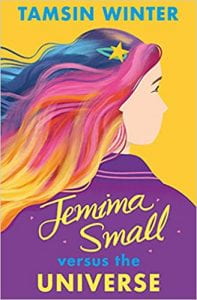Today, 10th June, is Empathy Day, which focuses on the power of stories to help us step in to the shoes of others. Here is a book which does just that, with sensitivity and lots of humour.
 Jemima Small versus the universe, by Tamsin Winter (Usborne, 2019) was short-listed for the Waterstones Book prize in 2020, but I’ve only just got around to reading it. I picked it up yesterday afternoon and didn’t put it down until I’d got to the end.
Jemima Small versus the universe, by Tamsin Winter (Usborne, 2019) was short-listed for the Waterstones Book prize in 2020, but I’ve only just got around to reading it. I picked it up yesterday afternoon and didn’t put it down until I’d got to the end.
Jemima Small is about to turn thirteen. She is clever, with a phenomenal memory, a precocious aptitude for maths, and wide-ranging interests from science to human rights. She is loyal, witty and kind. She is also fat. When she was younger, she thought being the biggest girl in the school was akin to being the tallest, or having the longest hair, or being double-jointed. Realisation of the social stigma attached grew shortly before she was eight, as she figured out that ‘there are good-shaped bodies, and bad-shaped bodies, and mine was one of the bad ones.’
Of course, things get worse at secondary school, and the name-calling and bullying step up a gear. The distress of navigating those first few years of secondary school is realistically evoked. Yet this is a genuinely funny book. Jemima has a sharp eye for the foibles of others, an irreverent and forthright tongue, a supportive (if annoying) family, and a great friend in Miki, who has huge emotional intelligence and always says the right thing.
Jemima is considering entering the celebrated TV Brainiacs competition, when her confidence takes a further knock. She is conscripted to a healthy living lunchtime group at school, which inevitably becomes known as ‘Fat Club’. There are interesting discussions to be had, not just around the insensitive way this is handled by the school, but also the rights and wrongs of such an initiative. Outrage at the stigmatization of their children leads some parents to withdraw their children from the group, and kick up a fuss in the local press. Although reluctant at first, Jemima does get a lot from the group. She finds her tribe, other pupils who understand her pain, and have got her back. She also finds Gina, an adult who motivates and supports her for the long run.
This book carries important messages about body-shaming and bullying, and judging others for their size, appearance, intellect or anything else. It is terrific on the nuances of name-calling and bullying. There’s the boy who seems to genuinely believe that his mates are just having a laugh when they repeatedly batter and bruise. There’s a relatable sliding scale, from of a bit of teasing from an annoying but loving older brother, to public humiliation inflicted by boys displaying their power over their victim to increase their stature among their peers, to the more private, vicious, persistent persecution that Jemima experiences at Lottie’s hands. Lottie, Jemima’s nemesis, is not fully drawn, and I was quite glad that she wasn’t given an interesting back story to explain her mean character – she makes sense in the story a cypher, and is thus more generalisable to other situations.
This is also a powerful tale of effort and of persistence. Jemima is clever, but there is a lot of work and systematic perseverance involved. (She has interesting thoughts about working memory and useful memory. And there are some buried memories that make sense of the disappearance of Jemima’s mother.) There is courage.
Here are some of Gina’s Dos and Don’ts:
- Don’t create barriers for yourself. Do break through them.
- Don’t decide to be invisible. Do take up space.
- Don’t shy away from success. Do give yourself credit for being awesome.
- Don’t avoid doing the things you love. Do listen to your body and make a splash!
This book is a treat to read, as well as an encouragement to debate and combat bullying and discrimination in any form. It is witty, acutely observed, the dialogue is convincing, the story bowls along seamlessly: it comes highly recommended.
